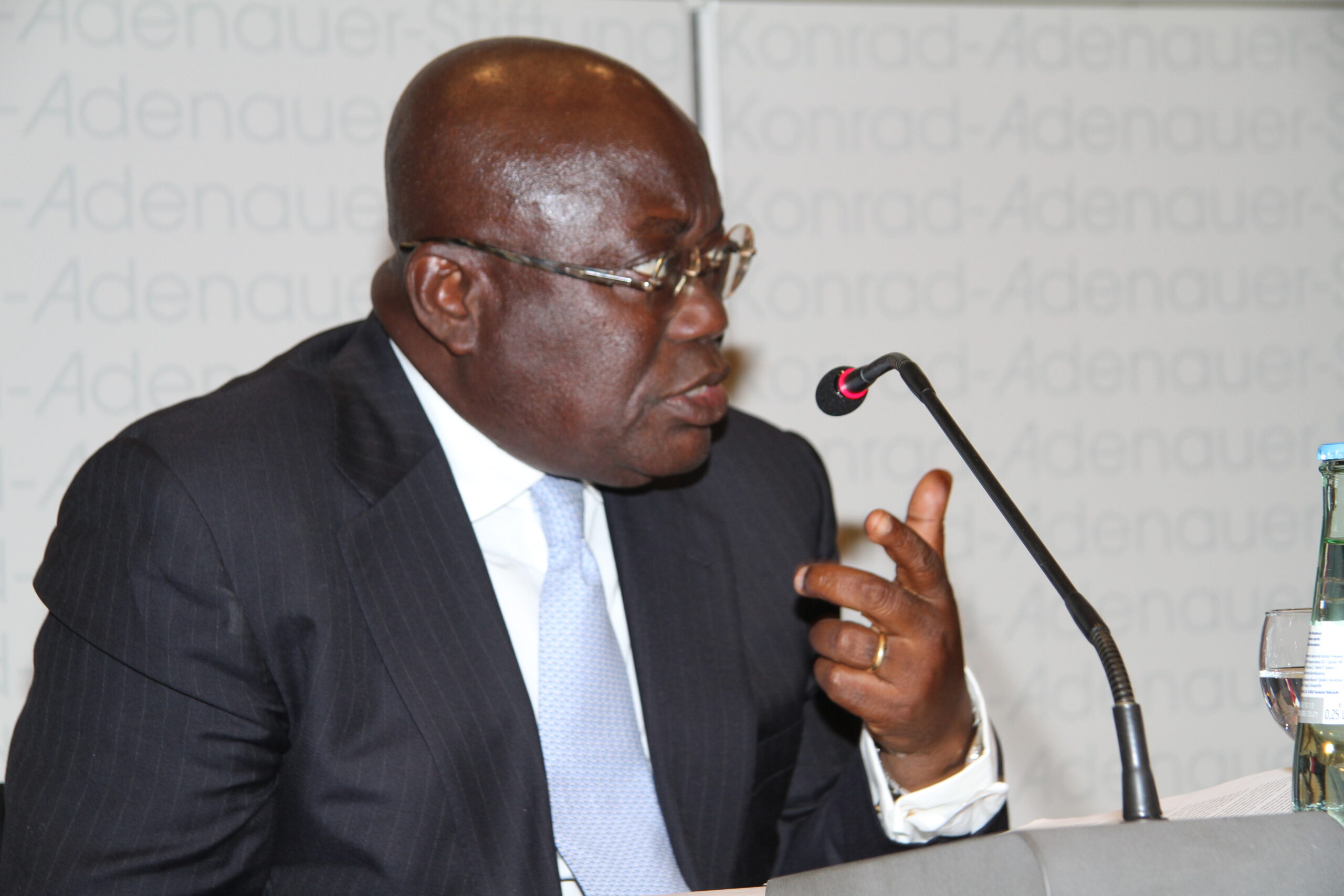Inspiration
Joy FM is not for my father!
Written by Manasseh Azure Awuni, August 2014

Manasseh Azure Awuni and the CEO of Multimedia Group Limited, Kwesi Twum
When I got to the Ghana Broadcasting Corporation (GBC) that Friday morning, I didn’t think I would spend more than one hour there. I was wrong. I spent 15 hours. That day turned out to be one of the most terrible days of my four-year old journalism career.
The day was December 24, 2010. I had stayed late at GTV the previous night with a video editor who managed to finish editing my story. We left at about 1AM. I returned there that morning to get a disk from the producer of the GTV’s Breakfast Show, Magnus George, so that I would transfer the story from the newsroom computer system. I was to give the story to him and go home to prepare and travel to Kete-Krachi to celebrate Christmas with my family the following morning.
The story on the video was about six minutes long, and from my experience as an intern and later a freelancer, GTV News would not use a story which was that long. I, however, wanted to tell the full story of the dangers associated with travelling to Kete-Krachi so I didn’t want to cut it. I was therefore happy when the Breakfast Show team expressed interest in the story and seemed willing to use it at that length.
The trouble, however, started when I went to the technicians to transfer the edited story onto a disk, which would be used by the Breakfast Show. As soon as they started, a white bearded supervisor whose name they later gave as Mr Akpalu came by and the story caught his attention.
“This is a very good story,” he said. “Whose story is that? When is it airing so that I can watch?” he asked. It was then that someone pointed at me.
“Is he with us?” he asked.
“Manasseh is not a staff here but he has been doing stories for us,” a technician told him.
“Who permitted him to transfer the story? Did he sign?” he asked and reached for a book in which anybody who transferred a story onto the disk had to sign. I had signed. And it was approved by Mr. Ebenezer Amparbeng, the editor on duty. Someone in that position needed to approve such transfer. Mr. Akpalu ordered the technicians to stop while he went to enquire from Mr. Amparbeng. When Mr. Amparbeng confirmed that, indeed, he had authorized me to transfer, Mr Akpalu didn’t come back to tell his subordinates to finish what he had interrupted.
When I was tired of waiting, I followed up to his office. Luckily, I found him and Magnus George near the old TV Newsroom. He asked Magnus George whether he knew me. Magnus George said he was the one who had given me the disk to transfer the edited story for use on the Breakfast Show. “We don’t do things like that. You don’t just allow anybody at all to transfer…” Mr. Akpalu went on and on.
He refused to rescind his decision. The Director of TV and all the directors were absent that day because GBC hadn’t paid salaries of staff and they didn’t want to be harassed by desperate staff who would have to go and face families at Christmas without money in their pockets. There was no one I could report to or appeal to. When I went back to the technicians, they said they could only take the risk when Mr Akpalu had closed and left the office. This means I had to stay until about 5pm.
I was most unwilling to give up on the story, because it was a “good” story and it was getting too old. It was an exclusive story about the drowning of two pastors of the Church of Pentecost in an overflowing stream on the road to Kete-Krachi. I had exclusive access to the incident and filmed everything. It was the story that had posed the greatest risk to my life; I had had to get waist deep into the turbulent stream so that I could film the doomed rescue operation which was taking place downstream. The strong waves of the stream had swept away the brand new Toyata Fortuner in which the two pastors were travelling.
When I returned to Accra with the story, GTV’s reporters, Peggy Ama Donkor and Edward Nyarko, took a look and said it was a good story. For three days, they tried to help me convert the video into a format that could be edited on GTV’s machines. The technicians said it was not possible. We all gave up, but after some months, I managed to get them to convert it after some hard-earned cedis of my national service allowance changed hands. But I was running out of time as the story had to be aired before we entered 2011 otherwise, it would certainly be a dead story, a story of the previous year.
At about 5pm, the technicians said they were busy doing the 7pm bulletin so I should wait until after the news. I waited; but when I got there after the 7pm news, the technicians had left “to eat supper.” Having stayed so late the previous night, I had fallen asleep while the news was on. The technicians returned a few minutes to the late news at 10 pm. I waited and they transferred it for me after the late news. Magnus George had shown me his office and asked that I push the disk under the door to his office and I did. I got home after midnight.
Later when the TV News editors saw the story, they thought it was too good to be ignored because of its length. Titi Anepe, who was the editor on duty used the story, which was titled A Journey to Kete-Krachi. The feedback was enormous.
At the 2011 Ghana Journalists Association Awards, that story was adjudged the Best TV News Report for the Year 2010. Another investigative piece I had done for GBC Radio also won the Best Human Rights Report of the Year. The strength of those two reports earned me the Most Promising Young Journalist of the Year. I had graduated from the Ghana Institute of Journalism six months earlier, and the awards boosted my career and inspired me to win the Journalist of the Year at the following GJA Awards in 2012.
I am not recounting this incident out of bitterness. Neither do I have the intention of indicting GBC where I cut my teeth in journalism. I just want to use this incident as an example to discuss the terrible attitude, which is stifling the progress of very talented and hardworking people I know.
Whenever I pass a comment about GBC which my colleagues there consider unpalatable, they are often quick to remind me that they (GBC) made me who I am and I must not forget to show some gratitude and humility. What they do not know or seem to forget is the hell I went through to have my stories aired, even though I was not going to be paid for the work I did.
For both GTV and GBC Radio, I did award-winning stories under stressful circumstances. I rented video cameras and travelled to as far as Bunkpurugu to get stories. I was never paid for any story I did for GBC Radio or GTV. These included all the award-winning stories I invested so much time, energy and resources to do. My payment was frustration, which compelled me eventually to write a petition to the Directors of Radio and TV as well as heads of Radio and TV newsrooms to complain about the human barriers I encountered when I did stories for them. Nobody replied my petition. But I kept doing stories for them until Joy FM approached me and offered me a position.
The only thing that saved me was that though I learnt a lot from GBC, I didn’t learn the work ethic there, and I was lucky to escape the work culture there. One common sentence that one heard regularly there was, “GBC is not for my father.” Some employees of the state broadcaster often said it to back their claim that they would not be appreciated even if they stressed themselves to do something extra.
I thought this terrible attitude to work was limited to the state broadcaster until I joined the Multimedia Group Limited. Last year, for instance, I gave the cell phone number of a young man in the marketing department to the PRO of the Korle-Bu Teaching Hospital, Mustapha Salifu, who wanted to know commercial rates for announcements. The hospital was marking its 90th anniversary and was going to embark on some promotional advertising. The young man was not happy that I gave his number out and actually confronted me when I returned to the office that day. When I gave out his number to a potential client the second time, he came to the newsroom and warned me. “This is my private line. If anybody wants to do business, give them the office line,” he told me.
When I expressed my dismay about his behavior, a colleague said, “Why are you worrying yourself? Is the company for your father?” I encounter similar disparaging comments and damaging work attitude on a daily basis. Indeed, Joy FM is not for my father. And the company you work for may not belong to your mother. But is that not where we earn our livelihoods?
My working life is only about four years old, but with my personal experience with workers, I can say attitude is one of the most damaging hindrances to the personal development of many professionals. It is good to have talent. And hard work is a much-cherished virtue. But hard work and talent cannot get you anywhere if you have a bad attitude towards work. Attitude is key.
According to John C. Maxwell, “People may hear your words, but they feel your attitude.” Former US President, Thomas Jefferson, teaches us that: “Nothing can stop the man with the right mental attitude from achieving his goal; nothing on earth can help the man with the wrong mental attitude.” For former British Prime Minister, Winston Churchill “Attitude is a little thing that makes a big difference.”
Lou Holtz, a retired American football player and coach, once said, “Ability is what you’re capable of doing. Motivation determines what you do. Attitude determines how well you do it.” The NBA legend, Michael Jordan, always had a positive attitude: “My attitude is that if you push me towards something that you think is a weakness, then I will turn that perceived weakness into a strength.”
What I have learnt is that one’s attitude to work should not be determined by one’s environment. It should not be determined by the kind of treatment you get. It is sometimes difficult but it is the best thing to do. The most destructive of all attitudes is the notion that you are only working for your employer and if you don’t put in extra effort, it is your employer who loses.
In his letter to the people of Colossus, Apostle Paul advised slaves not to allow how their masters treated them to determine their work attitude: “Slaves, in all things obey those who are your masters on earth, not with external service, as those who merely please men, but with sincerity of heart, fearing the Lord. Whatever you do, do your work heartily, as for the Lord rather than for men, knowing that from the Lord you will receive the reward of the inheritance.” (Colossians 3:22-24).
For workers who draw salaries from their employers, it is almost like a command to treat that business or establishment as your own. In the letter that the prophet Jeremiah sent from Jerusalem to the surviving elders among the exiles and to the priests, the prophets and all the other people Nebuchadnezzar had carried into exile from Jerusalem to Babylon, he said something very profound:
“Also, seek the peace and prosperity of the city to which I have carried you into exile. Pray to the LORD for it, because if it prospers, you too will prosper.” (Jeremiah 29:7).
In whatever you do, the success or failure of your company will always affect you directly or indirectly. Even if you have the option of moving on after the collapse of your company, the image of a collapsed entity will affect you. How would you feel if you were a panelist at a job interview and one of the two final shortlists is a former worker of Data Bank and the other from corruption-ridden GYEEDA? Which of them would you trust with a sensitive position?
It may seem justifiable to say the company you work for is not for your father and act negatively because of how you are treated, but you will become the ultimate loser. I believe that if your employer is not treating you well, the best way to punish them is to work hard like a fool. In this way, someone will spot you and give you a better offer, and when you leave, that employer will realise the irreplaceable asset they have lost.
Even if you work so hard and no one notices you and rewards you, God has a way of rewarding faithful servants. The benefits I have derived from winning the Journalist of the Year and other awards far outweigh any monetary payment GBC could have given me.
Attitude matters. Good attitude determines the difference between winners and losers, and not only hard work and talent. Last year when I received my prize package of 32-inch Samsung LED TV set, I handed it to Ernest Larme, a video editor at Multi TV. He was the one who edited my award-winning story. But that was not only the reason I gave him the entire prize package.
I had joined Multimedia only the previous month so when I returned with the story, I asked Joojo Cobbinah, who had been at Multi TV a bit longer to recommend a good editor to work on the story. He did not recommend Ernest. The young man he recommended always gave excuses why he could not do it and promised to do it the following day until I became fed up with him. Ernest volunteered to edit the story for me when he realised the frustration and disappointment his colleague was taking me through. When I was impressed with his hard work, I offered him money, but he rejected it. I felt so touched that when I got the package, I did not forget him.
I am on the same WhatsApp platform with the Managing Director of the Graphic Communications Group Limited, Keneth Ashigbe, and anytime the paper does an exclusive or interesting story, he would send messages early in the morning encouraging everybody to buy a copy of the paper and read. But I hardly see staff of Graphic sharing their stories on social media platforms such as Facebook. The reason why the Managing Director will be promoting the paper like a newspaper vender whiles reporters hardly promote their own stories may have something to do with attitude.
Perhaps, if Graphic were their father’s business, it would be different.
A positive work attitude is a culture that benefits the employee more than the employer and one must not allow external factors to determine their attitude. Always strive to be the best in everything you do, irrespective of your position, or influence or how you are treated. Strive for excellence despite the odds.

-

 Random Thoughts11 months ago
Random Thoughts11 months agoA Dutch Passport or a Ghanaian PhD?
-

 Foreign News10 years ago
Foreign News10 years agoEvery Animal Meat Is Not Beef! See All Their Names
-

 Manasseh's Folder12 months ago
Manasseh's Folder12 months agoManasseh’s Praise and Criticism of Akufo-Addo’s Action on the SML Scandal
-

 Guest Writers9 years ago
Guest Writers9 years agoProf. Kwaku Asare writes: Nana Akufo-Addo has no law degree but…
-

 Manasseh's Blog Posts9 months ago
Manasseh's Blog Posts9 months agoWho Started Free SHS?
-

 Manasseh's Folder10 months ago
Manasseh's Folder10 months agoIs Napo Arrogant? And Does It Matter?
-

 Manasseh's Blog Posts2 weeks ago
Manasseh's Blog Posts2 weeks agoA tribute to Naa Ashorkor
-

 Anti-Corruption10 years ago
Anti-Corruption10 years agoMANASSEH’S FOLDER: Unmasking Afenyo Markins, NPP’s apostle of integrity